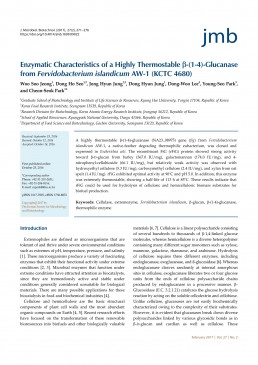Click the link above for more details.
Enzymatic Characteristics of a Highly Thermostable β-(1-4)-Glucanase from Fervidobacterium islandicum AW-1 (KCTC 4680)
Abstract
A highly thermostable β-(1-4)-glucanase (NA23_08975) gene (fig) from Fervidobacterium islandicum AW-1, a native-feather degrading thermophilic eubacterium, was cloned and expressed in Escherichia coli. The recombinant FiG (rFiG) protein showed strong activity toward β-D-glucan from barley (367.0 IU/mg), galactomannan (174.0 IU/mg), and 4-nitrophenyl-cellobioside (66.1 IU/mg), but relatively weak activity was observed with hydroxyethyl cellulose (5.3 IU/mg), carboxymethyl cellulose (2.4 IU/mg), and xylan from oat spelt (1.4 IU/mg). rFiG exhibited optimal activity at 90oC and pH 5.0. In addition, this enzyme was extremely thermostable, showing a half-life of 113 h at 85oC. These results indicate that rFiG could be used for hydrolysis of cellulosic and hemicellulosic biomass substrates for biofuel production.
CategoryPeer-reviewed PublicationsDate2017.02Linkwww.ncbi.nlm.nih.gov
